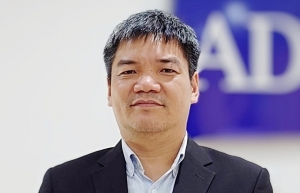Opportunities to unlock in Vietnam’s green finance arena
Financial institution shifts mark a departure from the early stages of favouring green initiatives, signalling the maturation of the market. The incentives that were initially directed towards green projects are now extending towards climate-related initiatives. As traditional capital sources face intensified competition, opportunities in the growing climate capital markets are increasingly appealing.
 |
| Mai Nguyen, representative, International Division, American Planning Association in Vietnam |
Competition in the global capital market extends beyond the domestic environment, making it imperative for businesses to enhance their competitive capabilities and sustainable development strategies.
Pioneering enterprises thrive by seizing new opportunities and leveraging them as catalysts for growth in a volatile international competitive landscape. Some Vietnamese enterprises have successfully implemented sustainable strategies, gaining access to green capital from international financial institutions.
These institutions now require more than mere self-commitment and seek tangible evidence of sustainability efforts. Employing tools such as third-party-verified green building certifications adds value by solidifying strategies and fostering human resource development, paving the way for innovation and long-term success.
Sustainable strategies are not entirely new to enterprises. Throughout their formation and development processes, enterprises have consistently taken actions to optimise their business operations.
Therefore, the initial step enterprises should take is to assess their activities and document the green achievements they have already accomplished. Building upon this foundation, they should enhance these activities and achievements based on their experiences, integrate additional green initiatives within their capabilities, and consolidate them into a more comprehensive sustainable strategy.
Enterprises, then, should transparently disclose their sustainable achievements as well as upcoming targets, potentially through sustainable development reports. This open communication enables enterprises to highlight their initial commitments to sustainable development and showcase their ongoing capacity for innovation to clients and potential investors.
However, relying solely on self-disclosure may lack persuasiveness, the next assertive step involves substantiating claims with quantifiable results verified by a third party to enhance objectivity. One of the most direct approaches to achieve this is by obtaining globally recognised green certifications. By pursuing and attaining these certifications, enterprises derive two primary benefits.
Firstly, they provide concrete evidence that demonstrates their commitments, leading to reputational benefits. Secondly, through the pursuit and practice of these certifications, enterprises gradually enhance their capabilities in implementing sustainable strategies. Initial hesitations and deficiencies in specialised personnel can be addressed accordingly.
Although one or two initial pilot projects may progress slowly, gaining experience will ultimately lead to easier and more effective implementation. This marks a turning point for enterprises to enhance their competitive advantage while pursuing green capital.
Globally recognised guidance-oriented certifications for enhancing capabilities have proliferated and are now widely accessible in Vietnam. Each industry possesses tailored tools for this purpose. In urban development, enterprises can focus on developing resource-efficient and climate-resilient structures using various globally recognised certifications.
Similarly, real estate enterprises can benefit from leveraging Global Real Estate Sustainability Benchmark. However, enterprises should exercise caution in selecting internationally recognised tools that are well-suited to Vietnamese conditions. Pursuing too many certificates or choosing inappropriate ones could have counterproductive effects, reducing effectiveness and dampening employee morale.
Collaborating with relevant stakeholders in both the public and private sectors can offer substantial advantages when approached strategically, complementing individual efforts. Operating independently of the community is impractical for enterprises, especially when navigating complex challenges. Actively engaging in and exchanging experiences within the sustainable business community can significantly benefit each enterprise.
Furthermore, maintaining continuous dialogue with government authorities and financial institutions is essential. Such engagements allow enterprises to demonstrate their adaptability and foster mutual understanding, facilitating smoother regulatory compliance and access to financial resources.
Vietnam ranks among the countries most severely impacted by climate change. Alongside its commitment to achieving net-zero emissions by 2050, the nation is garnering significant attention and investment for green development and climate change mitigation efforts.
In 2023, the International Finance Corporation planned to increase its investment in Vietnam from $2 billion to $5 billion over the next 2-3 years. Concurrently, the World Bank is contemplating allocating up to $7 billion for transportation infrastructure projects in Vietnam. These investments will inevitably necessitate elements and requirements for green development and climate change adaptation in Vietnam.
Additionally, last year the Asian Development Bank announced the Climate Innovation Financing Fund in Asia-Pacific, which will contribute to its ambition of mobilising $100 billion to combat climate change between 2019 and 2030.
 | Green finance and management essential for sustainable future On November 22, the Vietnam Institute of Directors will hold its annual Corporate Management Forum and its Board of the Year awards. Chairwoman Ha Thu Thanh talked to VIR’s Thuy Linh about the current state of green finance and green management in Vietnam and inspirations for this year’s award. |
 | Green finance development and promotion for Vietnam Vietnam is in the process of formulating policies to develop green finance markets. Nguyen Ba Hung, principal country economist from the Asian Development Bank in Vietnam, spoke to Thanh Tung about the opportunities and challenges of green finance development in the country, and policy recommendations. |
 | Green finance must be unlocked to develop The banking sector has been urged to unlock viable green finance to attract a broader investor base to facilitate its green transition. |
What the stars mean:
★ Poor ★ ★ Promising ★★★ Good ★★★★ Very good ★★★★★ Exceptional
Related Contents
Latest News
More News
- SSC steps up engagement with FTSE Russell on market reforms (February 09, 2026 | 17:33)
- IFC considers $50m trade finance guarantee facility for Nam A Bank (February 09, 2026 | 17:28)
- Hoa Phat Agricultural Development debuts shares on HSX (February 06, 2026 | 14:00)
- Vietcap’s VAD 2026 draws strong global investor turnout (February 06, 2026 | 13:30)
- New rules ease foreign access to Vietnam equities (February 05, 2026 | 17:29)
- 0.1 per cent tax proposed on each transfer of digital assets (February 05, 2026 | 17:27)
- Ministry of Finance tightens policy delivery at start of year (February 05, 2026 | 17:26)
- Vietnam steps up market reforms as FTSE Russell reviews upgrade progress (February 05, 2026 | 17:20)
- 2025 profits mixed amid strong energy and farming results (February 05, 2026 | 17:18)
- Cashless payments hit 28 times GDP in 2025 (February 04, 2026 | 18:09)

 Tag:
Tag:

















 Mobile Version
Mobile Version